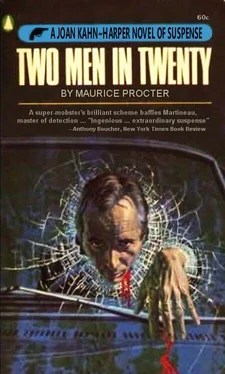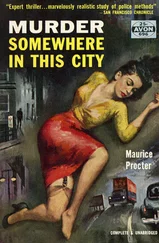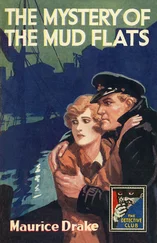Maurice Procter - Two men in twenty
Здесь есть возможность читать онлайн «Maurice Procter - Two men in twenty» весь текст электронной книги совершенно бесплатно (целиком полную версию без сокращений). В некоторых случаях можно слушать аудио, скачать через торрент в формате fb2 и присутствует краткое содержание. Год выпуска: 1963, Издательство: London : Hutchinson, Жанр: Полицейский детектив, на английском языке. Описание произведения, (предисловие) а так же отзывы посетителей доступны на портале библиотеки ЛибКат.
- Название:Two men in twenty
- Автор:
- Издательство:London : Hutchinson
- Жанр:
- Год:1963
- ISBN:нет данных
- Рейтинг книги:4 / 5. Голосов: 1
-
Избранное:Добавить в избранное
- Отзывы:
-
Ваша оценка:
- 80
- 1
- 2
- 3
- 4
- 5
Two men in twenty: краткое содержание, описание и аннотация
Предлагаем к чтению аннотацию, описание, краткое содержание или предисловие (зависит от того, что написал сам автор книги «Two men in twenty»). Если вы не нашли необходимую информацию о книге — напишите в комментариях, мы постараемся отыскать её.
Two men in twenty — читать онлайн бесплатно полную книгу (весь текст) целиком
Ниже представлен текст книги, разбитый по страницам. Система сохранения места последней прочитанной страницы, позволяет с удобством читать онлайн бесплатно книгу «Two men in twenty», без необходимости каждый раз заново искать на чём Вы остановились. Поставьте закладку, и сможете в любой момент перейти на страницу, на которой закончили чтение.
Интервал:
Закладка:
Maurice Procter
Two men in twenty
1
It must be admitted that City and County C.I.D. chiefs seldom become as agitated about 'foreign' crimes as they do about the crimes which occur in their own police districts. Like charity, the prevention and detection of crime begins at home. So, in the beginning, the Granchester City Police were not unduly worried by Scotland Yard's inquiries about certain oxygen cylinders.
But one fine morning Chief Superintendent Clay of the Granchester C.I.D. received a letter which made him raise his eyebrows. The Scotland Yard correspondent wanted to know what had been done and what was being done about his previous inquiries. It seemed that he was justified in being sharp and insistent. Clay sent for Detective Chief Inspector Martineau, of A Division C.I.D., and Martineau went to him at once.
'Those inquiries about oxygen cylinders from the Met,' Clay began, and his tone suggested that this was a prelude to censure. 'I passed them on to you for your information and action.'
Martineau nodded, looking at the blank side of the sheet of paper which Clay held in a fist which was like a ham shank with whiskers. Clay was a man who could grow hair anywhere except on the top of his head.
He continued: 'This time they've written direct to the Chief, and he's not too pleased about it. He wants to know what you've done. I want to know, too.'
Martineau had been living with trouble for twenty years. His grey eyes were steady as he looked at the C.I.D. chief. His hard but not unattractive face was serious, but composed. With a hand as big as Clay's, but bonier, he took the letter as it was proffered, and read it. At last he said: 'I gave the matter a good deal of thought. As far as I can see, there's nothing much we can do.'
'Nonsense,' said Clay as he took the letter back. 'There's always something. The matter is getting really serious. These London jobs aren't the biggest in the world, but this XXC mob has done eleven of them, and their total take now amounts to twenty-six thousand pounds. I'd go scatty if I had that lot on my books. Now then, in seven cases out of the eleven oxygen cylinders were left on the scene of the crime. And every one of those abandoned cylinders has been traced by its serial number to the North Western Oxygen Corporation's depot in Granchester.'
'It's a big depot.'
'What of it?' Clay wagged the letter at Martineau. 'We've got to answer this somehow. We can't just tell Scotland Yard that we've got enough troubles of our own. I can hang on to this letter for a couple of days. Put one or two good men on to the job, then it'll look as if we've done something.'
'Very good, sir,' Martineau said, and then he returned to his own office. He shrugged as he thought about the problem. The XXC thieves had not used more than one cylinder a fortnight. That was one cylinder out of thousands. Granchester and its surrounding industrial and residential areas housed and found work for several millions of people. Many hundreds of oxygen users were within the range of the N.W.O.C. depot's lorries. And that meant that there were hundreds of places where thieves might be able to obtain oxygen, acetylene, and propane.
In answer to a summons. Detective Sergeant Devery and Detective Constable Hearn appeared.
'There were some inquiries from the Metro about oxygen cylinders,' Martineau told them, and both men inclined their heads in admission that they knew of the matter. 'It's turned out to be a big job.'
They looked expectant, because they liked big jobs. He gave them all the details he had, and if their confidence ebbed they did not show it.
'Start where you like,' Martineau concluded, 'but it might be a good idea to go along to the depot and see what they can tell you.'
The suggestion was tantamount to a command. Devery and Hearn went to the N.W.O.C. depot, and there they were directed to the small office of Mr. Barden, the Cylinder Investigation Officer.
Barden was a man of medium size, lean and spry. 'You're lucky to catch me in,' he said when they were seated. 'They're keeping me busy.'
Only three minutes ago Devery had learned that there was such a thing as a Cylinder Investigation Officer. 'Ah, sorry,' he said. 'Perhaps I should have made an appointment.'
Barden let that go with a nod. 'I hope you've come to tell me that you've found something of mine,' he said.
Devery shook his head. 'On the contrary, we're seeking information.'
'Regarding what?'
'Some oxygen cylinders left behind after a number of safe robberies in the London district.'
Barden treated his visitors to a smile. He opened a drawer of his desk and took out a thin file. He opened the file.
'I'm already in touch with Scotland Yard about something of the sort,' he said. 'Cylinders left behind at seven out of eleven jobs, to be precise.'
'That sounds like the same inquiry. They wrote to you?'
'They wrote to the firm. It's my pigeon, of course.'
'Have you been able to do anything about it?'
Barden took a deep breath. 'Let me put you in the picture. Do you know how many lost, stolen or strayed cylinders I recovered last year?'
'No.'
'One hundred and twenty six. Two thousand pounds' worth.'
The policemen looked properly impressed, as indeed they were. Devery said: 'It looks as if you're on top of your job.'
'No. The job is on top of me. I quoted those figures to give you some idea of the problem. At this depot we have nearly two hundred drivers. They deliver fifty thousand charged cylinders every week to our customers, and they bring back as many empties. We don't sell cylinders, you know. We only rent the cylinders to registered customers, and of course they pay for the contents.'
'So you should be able to keep track of all cylinders, if they're numbered.'
'You'd think so, wouldn't you? Even at fifty thousand a week. We have security measures, and a good system of checking. But we lose cylinders every week. They don't get checked out. They disappear.'
'The drivers steal them?'
'In two hundred men there will always be a few rogues. And there may be rogues among the checkers. But they're not easy to find.'
'Could a cylinder be used for any other purpose, when it's empty?'
'No. Our thieves are mean fellows. Some of them will steal a pair of cylinders worth thirty-eight pounds for the sake of thirty bobs' worth of gas. The cylinders get lost. But that isn't always the procedure. Two years ago I caught a driver and a checker working in collusion. They were supplying unregistered customers with gas, and the driver was bringing the empty cylinders back to the depot. All they were stealing was the gas.'
'How do you find the cylinders?'
'I hunt for them, in garages, repair shops, small engineers' shops, and even on rubbish dumps.'
'I suppose you prosecute when you turn something up?'
'When I have proof of stealing or receiving. Receiving is hard to prove, especially with a registered customer. If he's caught with a cylinder he shouldn't have, he swears blind he got it in the normal way. If there's any mistake, he says, it must be a mistake of the depot staff. It's the same with the drivers. Unless you catch a driver absolutely red-handed, he simply says it wasn't his fault if his load wasn't checked out properly. Fifty thousand a week, remember. And if you try to sack a man without absolute proof of guilt, you've got a strike on your hands.'
'Well, this London mob just leave cylinders lying around. They know where they can get more. They must be in contact with one of your drivers.'
'Or one of our customers who is encouraging a driver to steal. Or one of the unregistered users who does the same.'
'Mmmm.' Devery was thoughtful. 'As you say, it's a problem.'
Читать дальшеИнтервал:
Закладка:
Похожие книги на «Two men in twenty»
Представляем Вашему вниманию похожие книги на «Two men in twenty» списком для выбора. Мы отобрали схожую по названию и смыслу литературу в надежде предоставить читателям больше вариантов отыскать новые, интересные, ещё непрочитанные произведения.
Обсуждение, отзывы о книге «Two men in twenty» и просто собственные мнения читателей. Оставьте ваши комментарии, напишите, что Вы думаете о произведении, его смысле или главных героях. Укажите что конкретно понравилось, а что нет, и почему Вы так считаете.












